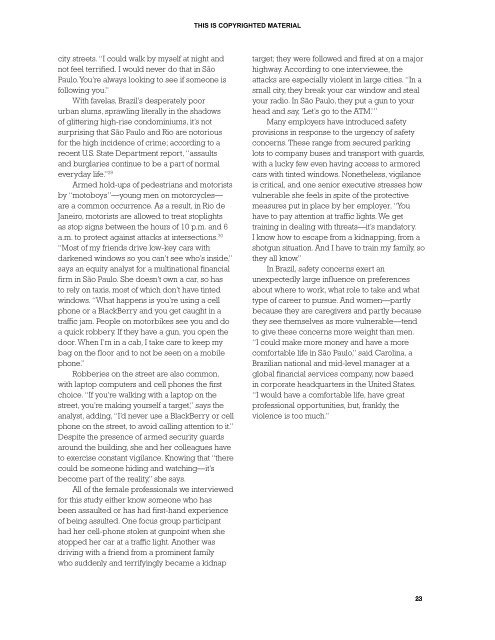The Battle for Female Talent in Brazil - Center for Work-Life Policy
The Battle for Female Talent in Brazil - Center for Work-Life Policy
The Battle for Female Talent in Brazil - Center for Work-Life Policy
You also want an ePaper? Increase the reach of your titles
YUMPU automatically turns print PDFs into web optimized ePapers that Google loves.
city streets. “I could walk by myself at night and<br />
not feel terrified. I would never do that <strong>in</strong> São<br />
Paulo. You’re always look<strong>in</strong>g to see if someone is<br />
follow<strong>in</strong>g you.”<br />
With favelas, <strong>Brazil</strong>’s desperately poor<br />
urban slums, sprawl<strong>in</strong>g literally <strong>in</strong> the shadows<br />
of glitter<strong>in</strong>g high-rise condom<strong>in</strong>iums, it’s not<br />
surpris<strong>in</strong>g that São Paulo and Rio are notorious<br />
<strong>for</strong> the high <strong>in</strong>cidence of crime; accord<strong>in</strong>g to a<br />
recent U.S. State Department report, “assaults<br />
and burglaries cont<strong>in</strong>ue to be a part of normal<br />
everyday life.” 29<br />
Armed hold-ups of pedestrians and motorists<br />
by “motoboys”—young men on motorcycles—<br />
are a common occurrence. As a result, <strong>in</strong> Rio de<br />
Janeiro, motorists are allowed to treat stoplights<br />
as stop signs between the hours of 10 p.m. and 6<br />
a.m. to protect aga<strong>in</strong>st attacks at <strong>in</strong>tersections. 30<br />
“Most of my friends drive low-key cars with<br />
darkened w<strong>in</strong>dows so you can’t see who’s <strong>in</strong>side,”<br />
says an equity analyst <strong>for</strong> a mult<strong>in</strong>ational f<strong>in</strong>ancial<br />
firm <strong>in</strong> São Paulo. She doesn’t own a car, so has<br />
to rely on taxis, most of which don’t have t<strong>in</strong>ted<br />
w<strong>in</strong>dows. “What happens is you’re us<strong>in</strong>g a cell<br />
phone or a BlackBerry and you get caught <strong>in</strong> a<br />
traffic jam. People on motorbikes see you and do<br />
a quick robbery. If they have a gun, you open the<br />
door. When I’m <strong>in</strong> a cab, I take care to keep my<br />
bag on the floor and to not be seen on a mobile<br />
phone.”<br />
Robberies on the street are also common,<br />
with laptop computers and cell phones the first<br />
choice. “If you’re walk<strong>in</strong>g with a laptop on the<br />
street, you’re mak<strong>in</strong>g yourself a target,” says the<br />
analyst, add<strong>in</strong>g, “I’d never use a BlackBerry or cell<br />
phone on the street, to avoid call<strong>in</strong>g attention to it.”<br />
Despite the presence of armed security guards<br />
around the build<strong>in</strong>g, she and her colleagues have<br />
to exercise constant vigilance. Know<strong>in</strong>g that “there<br />
could be someone hid<strong>in</strong>g and watch<strong>in</strong>g—it’s<br />
become part of the reality,” she says.<br />
All of the female professionals we <strong>in</strong>terviewed<br />
<strong>for</strong> this study either know someone who has<br />
been assaulted or has had first-hand experience<br />
of be<strong>in</strong>g assulted. One focus group participant<br />
had her cell-phone stolen at gunpo<strong>in</strong>t when she<br />
stopped her car at a traffic light. Another was<br />
driv<strong>in</strong>g with a friend from a prom<strong>in</strong>ent family<br />
who suddenly and terrify<strong>in</strong>gly became a kidnap<br />
THIS IS COPYRIGHTED MATERIAL<br />
target; they were followed and fired at on a major<br />
highway. Accord<strong>in</strong>g to one <strong>in</strong>terviewee, the<br />
attacks are especially violent <strong>in</strong> large cities. “In a<br />
small city, they break your car w<strong>in</strong>dow and steal<br />
your radio. In São Paulo, they put a gun to your<br />
head and say, ‘Let’s go to the ATM.’”<br />
Many employers have <strong>in</strong>troduced safety<br />
provisions <strong>in</strong> response to the urgency of safety<br />
concerns. <strong>The</strong>se range from secured park<strong>in</strong>g<br />
lots to company buses and transport with guards,<br />
with a lucky few even hav<strong>in</strong>g access to armored<br />
cars with t<strong>in</strong>ted w<strong>in</strong>dows. Nonetheless, vigilance<br />
is critical, and one senior executive stresses how<br />
vulnerable she feels <strong>in</strong> spite of the protective<br />
measures put <strong>in</strong> place by her employer, “You<br />
have to pay attention at traffic lights. We get<br />
tra<strong>in</strong><strong>in</strong>g <strong>in</strong> deal<strong>in</strong>g with threats—it’s mandatory.<br />
I know how to escape from a kidnapp<strong>in</strong>g, from a<br />
shotgun situation. And I have to tra<strong>in</strong> my family, so<br />
they all know.”<br />
In <strong>Brazil</strong>, safety concerns exert an<br />
unexpectedly large <strong>in</strong>fluence on preferences<br />
about where to work, what role to take and what<br />
type of career to pursue. And women—partly<br />
because they are caregivers and partly because<br />
they see themselves as more vulnerable—tend<br />
to give these concerns more weight than men.<br />
“I could make more money and have a more<br />
com<strong>for</strong>table life <strong>in</strong> São Paulo,” said Carol<strong>in</strong>a, a<br />
<strong>Brazil</strong>ian national and mid-level manager at a<br />
global f<strong>in</strong>ancial services company, now based<br />
<strong>in</strong> corporate headquarters <strong>in</strong> the United States.<br />
“I would have a com<strong>for</strong>table life, have great<br />
professional opportunities, but, frankly, the<br />
violence is too much.”<br />
23


